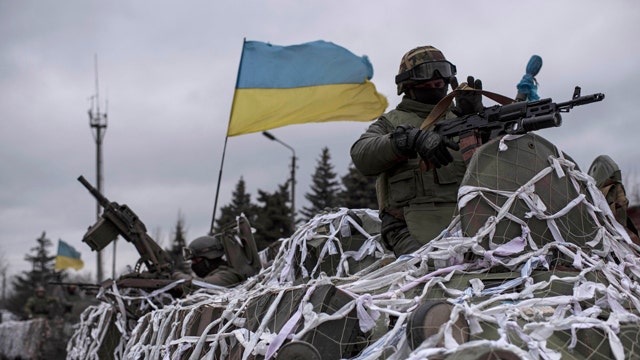A previously scheduled White House meeting between President Obama and German Chancellor Angela Merkel took on greater import as both leaders attempt to keep a united front in the midst of a dispute over whether to arm Ukrainian forces battling Russian-backed separatists in the country's east.
The two leaders met in the Oval Office on Monday morning.
The Wall Street Journal reported late Sunday that Obama has held off on making a final decision on whether to provide so-called lethal aid to Kiev until his meeting with Merkel, which will also be attended by Vice President Joe Biden.
Support for weapons deliveries has grown in Washington as Russian-backed separatist rebels have made significant gains in eastern Ukraine in recent weeks. For her part, Merkel has given Russian President Vladimir Putin until Wednesday to agree to a road map to end the bloody fighting. Merkel and her French counterpart, Francois Hollande, spoke by phone to Putin and Ukrainian President Petro Poroshenko Sunday, with the aim of finalizing a deal Wednesday in the Belarussian capital of Minsk.
The differing approaches of the U.S. and Germany came to a head over the weekend at a security conference in Munich, Germany, at which Sen. Lindsey Graham, R-S.C., accused Germany of abandoning Ukraine, which he described as a "struggling democracy."
That comment brought a rebuke from German Foreign Minister Frank-Walter Steinmeier, who said "Perhaps we are so insistent [on negotiation] because we know the region a bit."
It fell to U.S. Secretary of State John Kerry to smooth things over, as he said both the U.S. and Europe were "united in our diplomacy."
"There is no division, there is no split," Kerry added. "I keep hearing people trying to create one. We are united, we are working closely together."
German diplomats have warned that any new arms deliveries will cause Russia to respond in kind, leading to more bloodshed and the end of any chance for a negotiated settlement to the conflict. Western officials told the Journal that Germany will move to increase sanctions against Russian companies if Merkel determines that Russia has blocked a deal.
For their part, some U.S. officials tell the paper that giving Ukraine more weapons would force Putin to rethink his strategy. Western and Ukrainian officials believe that regular Russian troops are embedded with the rebels. Russia has denied this, and officials say that has caused authorities in Moscow to hold secret burials for troops killed in Ukraine all over the country in the hope of avoiding suspicion and backlash from military families. Russia has also repeatedly denied providing training and equipment to the separatists.
"If we help Ukrainians increase the military cost to the Russian forces that have invaded their country, how long can Putin sustain a war that he tells his people is not happening?" Sen. John McCain, R-Ariz., said Sunday in Munich.
The plan presented to Poroshenko and Putin last week by Merkel and Hollande would call for a case-fire and the withdrawal of heavy weaponry from the front line to create a demilitarized zone. The plan would also call for separatist forces to withdraw from the territory they have captured while preventing Ukrainian forces from entering it during any future negotiations for a permanent settlement.
The Associated Press contributed to this report.





